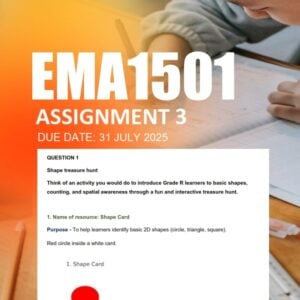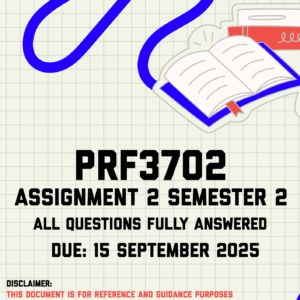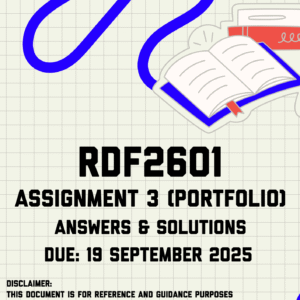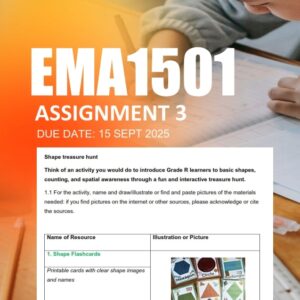Description
EMA1501 Assignment 4 2024 | Due 20 August 2024. All questions answered.
Question 1
The diagram below is the data handling cycle, and it is used in emergent mathematics as a tool to collect, organise, represent, and interpret numerical information or data.
1. In the Foundation Phase, learners are taught to work with all four elements of the data handling process, however, in the Grade R classroom, learners are taught how to work with data, starting with collecting, sorting and then representing the data. In two to three sentences, explain why Grade R learners only stop at representing the data. (2)
2. In your own words, compare and contrast the sequence in which Grade R learners master data handling skills to the sequence in which Grades 1 to 3 master data handling. Write it in two paragraphs of about 5 to 6 lines or about 100 words each. (5×2=10)
3. Read the case study below, and then follow the instructions provided at the bottom:
In Miss Mofokeng’s classroom, it’s circle time in the morning; the discussion is based on the theme of the week; “feelings”. Miss Mofokeng asks each child to pick out a face from the container full of cardboard cutout emojis that show how they feel that morning. The emojis show the following expressions: sad, happy, tired, excited, and worried. Miss Mofokeng now has twenty cutouts in the middle of the circle.
3.1. Suppose you are Miss Mofokeng; plan and involve learners in a data handling activity based on the case study above. In your activity, include
• the problem statement/question (2)
• present the activity using the steps of the data handling cycle. This should also include at least three questions in each step, as well as illustrations to guide the children in the process. (4×7=28)
3.2. After completing the activity in 3.1, answer the following questions:
• Did the data-handling process solve the investigation? (1)
• What went well? (2)
• What would you do differently next time (remember, there is always room for improvement)?
Question 2
Assessment is an important part of teaching and learning and should, therefore be part of everyday practice. Assessments help the teacher to gauge how children are progressing, to recognize their needs and then plan activities to support learning.
2.1. Think and reflect on your days as a primary or high school student.
Write down three things you recall liking about assessment and three things you recall disliking about assessment. Give reasons for both the things you liked and disliked about assessment. Remember, these should be based on your personal experiences with assessment while in school. (5×2=10)
2.2. There are varying views about the purposes of assessment. One view is that assessment aims to establish what the child has learnt and what the child has not learnt. Another view is that assessment should be used during the learning process to support the child’s learning. Argue or motivate why assessment is not only a tool for testing children’s learning, but also a tool to support learning. (2×4=8)
2.3 Within the context of early childhood teaching, do you agree or disagree with the views in 2.2. above?? Corroborate your opinion. (5)
2.4 In 3 paragraphs of 5 to 6 lines or 100 words, name (1×3=3) and categorize 5×3=15) the 3 assessment methods most appropriate to emergent mathematics.
2.5. A checklist is a recording tool developed from a range of learning objectives or assessment criteria found in curriculum policies. Using the steps from your learning guide, design your own checklist for an activity on counting that is appropriate for Grade R. (6) The checklist should have at least (6) criteria. (12)
[52]
TOTAL: 100





















Reviews
There are no reviews yet.